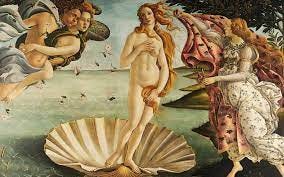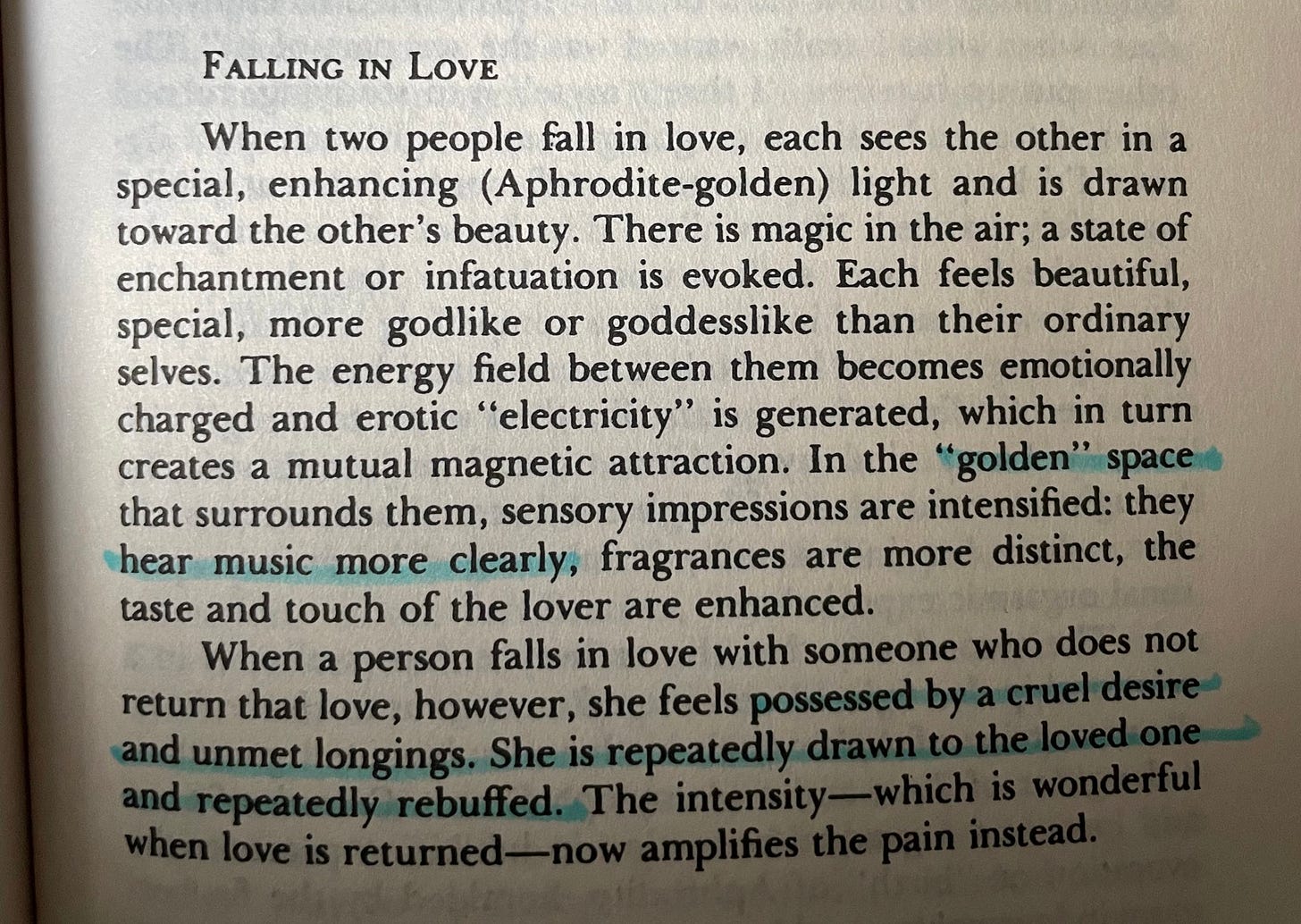What’s love got to do with it?
I’ve been philosophizing about love a lot lately. Blame it on Venus retrograde, blame it on my ENFJ type pattern — what have you! But the more I contemplate what Carl Jung meant by the individuation process, and *how* shadows integrate with the light… it hit me. Individuation is the how, Love is the what.
“The goal of individuation is wholeness, as much as we can accomplish, not the triumph of the ego.” — James Hollis, Jungian Analyst
In other words, a Jungian understanding of the psyche will tell you all about mechanisms like projection, the collective unconscious, the transcendent function — and so on. The dynamics of how this works seems to me to be a very left brained way of describing what the mystics, the poets, and the romantics have been saying about Love all along.
Individuation is a process of letting go. The ego cannot control it, you cannot force your way into higher consciousness. Instead, it is a process of allowing the light of consciousness to embrace the darkness. Jung says that this individuation process happens to everyone naturally. All we can really control is how much resistance we have to it. But what is this thing that is happening naturally? What is the energy that is pushing us forward?
What is love? Baby don’t hurt me
“The practice of love offers no place of safety. We risk loss, hurt, pain. We risk being acted upon by forces outside our control.”― bell hooks
Personally, I think about love as what happens when you take another as a part of yourself. When this is self love, this can be consciously becoming aware of a shadow and integrating it into the self. When loving another, it is the realization that you are connected to that other. As bell hooks says, love is a risk that involves forces outside our control — because it is an integration of the other into our awareness. In other words, we are bringing another into our hearts.
Love feels like letting a stranger into our home. We feel crazy when this energy takes over us. Often, when we are consumed by “love” we are actually projecting our unconscious positive qualities onto the object of affection. Through love, we bring these parts of us back to our consciousness. We come home to ourselves.
All you need is love
Love is such a vague term that it is difficult to write about. In my opinion, the English language might need more terms to help us better describe what we are even talking about. However, I think that the word love is vague for a reason — it is holistic. Some may say God is love, everything is love, love is wholeness. For the logical brain you may be wondering: if love is everything, then what is love not? What is it that we are even describing?
Now, that is a big question. One that I do not have time to answer in this Spiral Shower post. But it’s a question that I plan to unpack in this blog overtime. I’m working on crafting a better argument to help tie together the concepts of individuation and love. I believe that learning how to love and committing to it as a practice is the key to making the individuation process much easier. Essentially, love is the energy that releases you from resistance.
“Love is a decision, it is a judgment, it is a promise. If love were only a feeling, there would be no basis for the promise to love each other forever. A feeling comes and it may go. How can I judge that it will stay forever, when my act does not involve judgment and decision.”― Erich Fromm, The Art of Loving
The quote above is from Erich Fromm, a social psychologist, psychoanalyst, sociologist, and philosopher. He was a German Jew who fled the Nazi regime and was critical of Freud. I recently read his book “The Art of Loving” and the way he defined love as a concept was pretty life changing. I plan to explore more of Fromm’s work in the future.
There are a lot of implications to this connection between love and individuation.
Can learning about individuation make you a better lover?
Is this why people argue that love is about “surrender?”
If love is about mixing the conscious and unconscious components, is that why it makes people feel so crazy?
Can understanding the functions of the psyche help us make better decisions in love?
In the title of this post, I say that love is “alchemical.” I think we can see this from none other than Aphrodite, Goddess of Love. She is also an alchemical archetype, according to Jungian Analyst Jean Shinoda Bolen.
Ever since reading Bolen’s book “Goddesses in Every Woman,” I’ve found myself connecting to this Aphrodite archetype. It seems to be the pattern that showed up earliest for me in childhood, but a part of her has felt stuck in the unconscious, living as a repressed shadow.
In my understanding, the story of Aphrodite can show an example of how taking another as a part of yourself leads to enhanced creative power. Jung’s process of individuation, the way in which opposites meet and transform via the transcendent function, is very alchemical in nature. The energy that spurs this is inherently creative, and that energy is love. Thus, love and creativity are intrinsically linked. This explains why Aphrodite is both the goddess of love and also serves as a creative muse. To be a lover is the same thing as to be willing to transform. To be a lover is to be not afraid of change. To be a lover is to be willing to offer up all of yourself to the creative process.
This is inherently scary from the ego perspective. In order to love, the ego must die.
Now, let’s splash around some thoughts.
Below are some quotes that relate to this concept, as well as some realizations I’ve had recently that I’ve shared to Twitter.
According to Jung, genuine loving never involves trying to force yourself or your feelings on a beloved; if you are doing so, then it is not love. It is power pretending to be love. — Henry Abramovitch
There was a discussion on Twitter about the difference between romantic and platonic love. I theorized that part of what makes romantic love feel more intense is because it is literally a different chemical reaction. I think if you were to observe what is happening in the psyche and compare ingredients (how many ounces of shadow are we adding to the mix), we’d be able to literally see a difference. But alas, the components of the mind are not physical, so all we are left with is a feeling. A feeling that is nearly impossible to put into words, yet can be readily identified to those initiated.
You can read the entire thread by clicking below.


Since we’re talking about love here, I will leave you with this promise I made to myself. To me, a commitment to love is a commitment to the Self just as much as it is a commitment to God. And by God, I mean this sense of universal, interconnected wholeness that we all feel — whether or not we have a name for it.
We find our way back to ourselves through each other. The process of “self-growth” is the process of letting go of the ego and embracing the shadows, anything that you’ve identified as “not you.” Don’t get me wrong — this is scary, perhaps the hardest thing for any human to do. But letting yourself mix with foreign energy is perhaps the most powerful, creatively inspiring thing that anyone can do.





Keep writing ✍
You're good at it